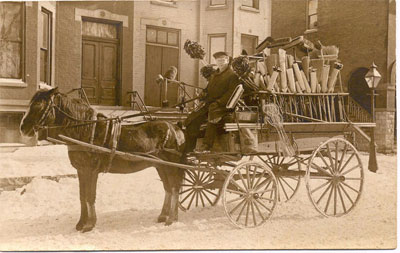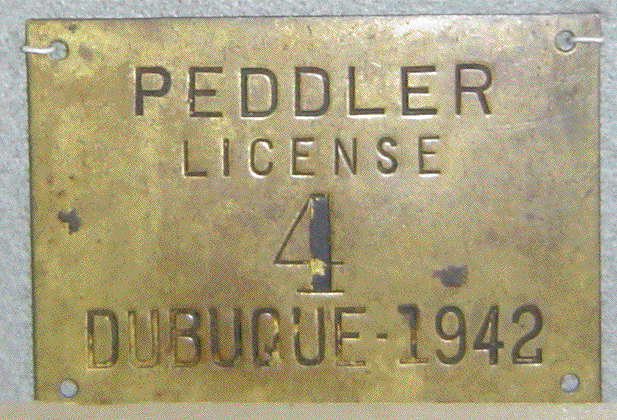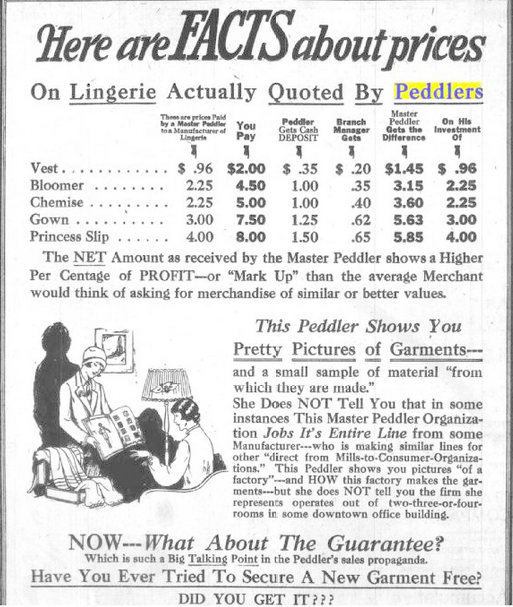Encyclopedia Dubuque
"Encyclopedia Dubuque is the online authority for all things Dubuque, written by the people who know the city best.”
Marshall Cohen—researcher and producer, CNN
Affiliated with the Local History Network of the State Historical Society of Iowa, and the Iowa Museum Association.
PEDDLERS
PEDDLERS. Wandering salespeople, peddlers usually traveled by foot carrying their wares or with a cart or wagon. They sometimes doubled as performers, supposed healers, or fortune-tellers.
Peddlers had an important role in supplying isolated populations with basic goods such as pots and pans, horses, and even news. In the United States, the era of the traveling peddler probably peaked in the decades just before the CIVIL WAR. Advances in industrial mass production and freight transportation during the war laid the beginnings of modern retail and distribution networks. Increasing dense population, modern transport, mail order, refrigeration and other technologies have allowed even rural residents other ways of obtaining needed goods. In 1906 an estimated twenty to twenty-five peddlers earned a living in Dubuque. From April through June, peddlers were responsible for collecting large amounts of iron which was sorted and resold. (1)
One of the earliest examples of peddling in Dubuque came in the area of politics. At each polling place were ticket peddlers. In November 1888 it was reported that during the first hour or two they did not have much of an effect and those in line "appeared as though every man had made up his mind how he would vote." In the afternoon, however, a large number of fraudulent Republic and Jacksonian tickets were found. The top of these tickets had the names of the National Democratic and state nominees while the names of the county and township officers were printed underneath. (2)
Taxing honest peddlers traced its history to 1874 and the Internal Revenue Service:
Peddlers of tobacco, more than 2 horses.......$59.00
Peddlers of tobacco, 2 horses.................$25.00
Peddlers of tobacco, 1 horse..................$15.00
Peddlers of tobacco, walking or riding on
public conveyance........................$10.00 (3)
In June 5, 1900 the Dubuque County Board of Supervisors passed a resolution that peddlers throughout the county, outside of cities and towns, had to pay for a license, paid quarterly in advance:
Peddlers on foot, per annum ...............$5.00
Peddlers with vehicle and one animal......$10.00
Peddlers with vehicle and two animals.....$20.00
Peddlers with vehicle and four animals....$40.00 (4)
Merchants in Dubuque felt the effect of loss sales and used advertising to compete:
People who paid $10 for a set of decorated
dinnerware to peddlers who canvassed the city
a few days ago are urged to see a handsomer
and better set at Althauser's which he sells
for $2.98. (5)
Extraordinary showing of rare small pieces...
prices much below those of the common peddlers
showing goods in fake stores. (6)
Fearing that their half-page advertisements were not enough, newspapers used characterizations.
Most of them are Armenians possessing little black
moustaches and dark greasy skins...That the dusky
fellows are having a profitable business is shown
by the fact that they appear at the city hall
every day and each secures a license for the day
paying $1...These peddlers leave practically no
money in the city as they do not stay at hotels...
and spend nothing except for the license fee,
some bread, cheap meat and a few vegetables. (7)
One industry that felt especially victimized were soda water dealers. At picnics, small boys waited for the opportunity to hide the empty bottles which were then sold to peddlers who sold them for more money to the soda water manufacturers. In June, 1906 the announcement was made that the manufacturers had hired an attorney to prosecute the peddlers who bought the bottles. (8)
Female residents of the Dubuque's North End complained about three women peddlers who refused to leave residences without making a sale. (9)
In 1925 all peddlers operating in the city paid a license fee of $2 per day while transient merchants who rented space for a short time paid a $5 per day license. (10) Newspapers in 1926 began running half-page advertisements warning of "floaters." (11) These were regular features in 1932.
Street hawkers who sold novelties from temporary stands on street corners were to be barred from Dubuque under the terms of an ordinance proposed in 1928 by the DUBUQUE RETAIL MERCHANTS BUREAU. (12) According to the proposed ordinance it would be unlawful to attract customers with loud talking, singing, music, unusual noises or entertainment, or the use of flares or lights. The ordinance would also charge a license fee of $50 for the first day and $25 for each succeeding day to anyone conducting outdoor shows on privately owned property. Transient merchants and peddlers would be charged $10 per day and would be required to wear a badge at least 4.5 inches in diameter. This badge would be furnished by the city and would state the business of the person wearing it. (13)
Members of the Retail Merchants Bureau in 1932 requested that City Manager R. M. Evans require persons selling merchandise door-to-door or who took orders for goods obtain a peddler's license. Their action followed the state attorney general declaring that representatives of out-of-town companies who sell merchandise house-to-house or who take orders had to obtain a peddler's license. (14)
The concern with peddlers, however, caused problems for at least one Dubuque merchant. HUMKE SANITARY BAKERY filed a petition in Jackson County in 1932 seeking $200 in actual damages from the town of Bellevue and $1,000 in punitive damages as well as a temporary injunction restraining city officials from arresting salesmen or deliverymen of the bakery. The Bellevue mayor and marshal contended, and were upheld in court, that the delivery of bread and cakes could not be made unless the bakery purchased a peddler's license. (15)
One of the most celebrated places for outdoor selling was the FARMERS' MARKET. In 1940 gardeners, other farmers near Dubuque, and the Dubuque retail food distributors complained about competition with other food sellers. These people from outside the immediate area were selling produce with paying licenses on the grounds they had raised the food or were agents of those who raised it. All that had been required of people seeking a permit was a signed statement that he was the grower or the agent of the grower. A new ordinance proposed that such a statement had to be supported by three residents of Dubuque before the permit was issued. (16)
---
Source:
1. "Any Rags, Bones, or Bottles To-Day?" Dubuque Telegraph-Herald, April 17, 1906, p. 17
2. "Democrats Win," The Herald, November 7, 1888, p. 4
3. "Notice," The Dubuque Herald, April 26, 1874, p. 1
4. "Here's a Good Idea for Dubuque," The Dubuque Herald, June 6, 1900, p. 8
5. Advertisement, Dubuque Telegraph-Herald, April 1, 1903, p. 16
6. Roshek advertisement, Dubuque Telegraph-Herald, November 17, 1908, p. 5
7. "Peddlers Still Infest the City," Dubuque Telegraph-Herald, July 125, 1914, p. 27
8. "Sodawater Men After Peddlers," Dubuque Telegraph-Herald, June 1, 1906, p. 11
9. "Women Peddlers Are Very Bold," Dubuque Telegraph-Herald, June 21, 1907, p. 5
10. "Christmas Tree Vendors Quizzed," Telegraph-Herald, December 20, 1925, p. 15
11. Advertisement, Telegraph-Herald, September 1, 1926, p. 8
12. "'Street Hawkers' to be Barred Here," Telegraph Herald and Times Journal, August 5, 1928, p. 4
13. "Ordinance Aimed at Street Hawkers," Telegraph-Herald and Times Journal, July 3, 1928, p. 9
14. "Merchants of City Make New Appeal," Telegraph-Herald, October 26, 1930, p. 21
15. "Dubuque Firm Sues Bellevue," Telegraph-Herald, September 28, 1932, p. 14
16. "Public Parking Lot is Sought," Telegraph-Herald, April 17, 1940, p. 1




